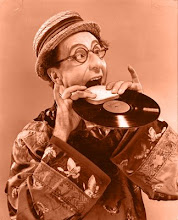Charlie v. Charles
Can I get much further from true Third Banana comedians than Chaplin? Geoff argues that Charlie certainly qualifies for Third Banana status here in the States as we, well, booted him out (or, rather, cowardly locked him out) in 1952. Perhaps, but like so many other colossal flubs on the part of America's Powers That Be, Chaplin's shameful expulsion has largely gone down the memory hole, as have his leftist politics, and today his films tend to stand on their own. Nevertheless, Third Banana or Ultimate Top Banana, this Punch review of City Lights, arguably Chaplin's finest feature, deserves some attention for its keen insights and remarkable prescience. E. V. L., the Punch film critic who also disproved the theory that the world in 1930 was united in its love of Keaton's MGM talkies, here examines the pros and cons of City Lights, the nature of Charlie's fame, and, to top it off, charts the potential path of Chaplin's career in sound. Indeed, as it turned out, the Tramp and sound were mutually exclusive and while Chaplin, now Mr. Charles, didn't really turn into a dramatist, most of his talkies are pretty heartbreaking. There's an interesting dig at Harold Lloyd in there, too, whose comedy megastar status had yet to fade in 1931. If I disagree with E. V. L. about anything here, it's his assessment of City Lights' crushing final moments. There's nothing positive about that ending; it's a profoundly cruel scene with both the Tramp and the Flower-girl now permanently separated from one another by personal and social expectations, easily the darkest ending of any of Chaplin's films. As Walter Kerr writes in The Silent Clowns, "The end is isolation, face to face, smiling through ice."
Labels: Charlie Chaplin, cinema, Harold Lloyd









6 Comments:
Roger Ebert, in his Great Movies essay on City Lights writes "She sees, and yet still smiles at him, and accepts him. The Tramp guessed correctly: She has a good heart, and is able to accept him as himself."
I think this is the biggest misread I've ever encountered in the work of a major critic. The tramp guessed correctly? Yes, but his guess was not that he would be accepted as himself. He tries to run away! He guesses that his only remaining illusion is about to be ripped to pieces and that he will have to take it smiling. And so it plays out, in agonizing close-up.
Ebert's interpretation both diminishes the Tramp's sacrifice and robs the conclusion of its purpose. The awkward redundancy of the Tramp's final line, "You can see now?", painfully underscores how little there is left to say now that the truth has been revealed. That final close-up of Chaplin, hopelessly ensnared in a prison of his own making, is one of the most gut-wrenching things I've ever seen and I find it hard to believe it's subject to multiple interpretations. I suspect Ebert slept through it.
I think Limelight offers some clues to what happened after the movie ended. She loved him out of a sense of gratitude but he knew this and left her to someone more on her current level.
I agree.. The distance between the characters also speaks to the inherent drawback to the Tramp's comic chameleon-like qualities; he can just as easily be anything, but by the same token he's effectively no one at all. The tragic distancing of the Tramp and the flower girl is a direct consequence of his ever-shifting identity. There's no reason to assume that this quality, the very core of the Tramp character, can be "overcome" in future in order to allow him to be any kind of husband or father.
I agree that The Tramp changes a lot, but one characteristic is constant from Kid's Auto Races to Modern Times. The Tramp loves to defy his social status by preening, strutting, adopting a hilariously refined attitude of shabby gentility in the face of his reduced circumstances. That's one reason why City Lights is so tragic. At the end, he's beaten down beyond even his own capacity for self-deception, and his exposure to the flower girl is one final kick in the face. As you said, it's very cruel.
I just happened to catch The Gold Rush on TV, the original, un-tampered with version. I hadn't seen it in a while but it may very well be his best film. The only thing it's missing is the sadness and the beauty of the City Lights ending, for me the best ending in all of moviedom.
Post a Comment
<< Home